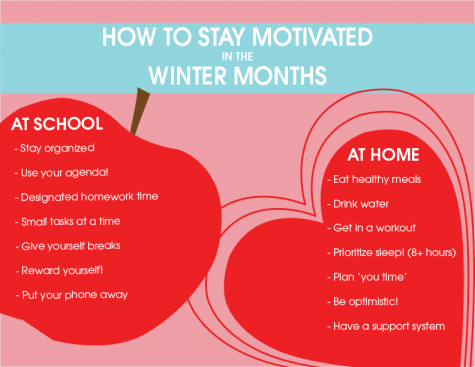Ways to stay motivated in the winter months
January 29, 2020
8
During School
Stay organized:
In order to make sure you get all of your tasks done and stay on top of things, staying organized can be very helpful. Whether it is having your notebooks labeled, making a to-do list or having a designated homework folder, staying organized is a key way to make sure you get everything done without getting too stressed out.
Use your agenda:
Manual (finally) gave them to us for a reason! Use that little book to your advantage and write down all of your homework you have to do that day. Make sure to stay on top of long-term projects by writing down the due date and several reminders throughout the span of the project. Setting deadlines for portions of the project can be another great way to avoid procrastination and keep your stress levels low while working on long-term homework. Using your agenda will also prevent you from forgetting those little assignments that your teachers slip in at the end of class.
Designated homework time:
After you write down everything that needs to be done, designate a day or time to do that work based on when it’s due and how long it will take. This can be done in many different ways such as assigning a specific day that you always do your homework, a certain frame of time after school or utilizing your study skills to get work done. Having a set time to finish all of your work will prevent you from procrastinating and make sure you get everything done on your list.
Small tasks at a time:
When completing big projects or huge loads of homework, completing small tasks with breaks in-between will keep your mind fresh. Whether you work on one subject at a time or just one worksheet, completing small tasks at a time will make your mountain of homework seem more manageable. Breaking it down and seeing the smaller pieces will prevent you from avoiding homework due to the stress it induces.
Give yourself breaks:
In between your designated small tasks, giving yourself five or ten-minute breaks to scroll on your phone, get a snack or just relax for a minute will help your brain stay fresh and focused while actually completing the tasks. Taking time in between tasks and refreshing your brain will make the tasks seem more manageable and motivate you to complete it so you can get to the next break.
Reward yourself:
After you complete the small tasks you have broken your homework into, reward yourself with a snack, a phone break or even a moment to breathe. Recognizing that you completed something you had to do and congratulating yourself for that is an easy way to keep yourself motivated to continue to complete more tasks. It will also keep you in a better mood, making any task a bit easier to complete.
Put your phone away:
Everyone does it. Getting distracted by social media or your favorite game can prevent you from focusing in class, completing assignments or even sleeping. Putting your phone away while in class and focusing on what’s being taught will do wonders for your grade and your homework time. Understanding the concepts will help you to have an easier time doing homework. Putting your phone away while doing homework is one less distraction from your assignment. Another big problem revolving around phones is the lack of sleep they cause. Whether you are watching Netflix at midnight, scrolling through social media or even Facetiming friends, staying up on your phone at night cuts down your precious sleep time by keeping you up or damaging your sleep with the blue light the screen lets off. Aim for your phone being off two hours before you go to sleep so your sleep is not harmed by your phone’s light.
AT HOME
Eat healthy meals:
Especially during the cold winter months, eating healthy is a challenge for most students. Since most fruits are not in season, people tend to be discouraged to add healthy things onto their plate in general. Even though this is true, eating healthy meals have a multitude of benefits for brightening your spirits during this time of the year. Adding whole grains, good proteins (such as grilled chicken, fish, nuts, peanut butter, etc.) and good fruits and vegetables to your plate can help tremendously by lifting your mood and keeping your body healthy. Eating healthy foods and using it as fuel for your brain and body will make you feel more focused and awake during school, making it easier to concentrate.
Tip: According to Showbiz CheatSheet, some good fruits that are ripe and ready to eat during the winter are pears, apples, grapefruit, kiwi, bananas and oranges.
Drink water:
Along with healthy eating, it is easy to forget to drink water during the winter months due to it being cold outside and a hot coffee sounding much more appealing. Although a nice cup of coffee is okay every now and then, water is the best drink for your health and to keep your body running smoothly. Especially for athletes, hydrating is so important but often forgotten during the winter months. According to Healthy Kids, students ages 13+ should drink roughly two liters of water a day for optimal performance. If water is not your thing, drinks like green tea or herbal teas are also great for vitamins, nutrients and the hydration benefits of water while having more taste than regular water.
Get in a workout:
Exercise is so important to health in general. According to VeryWell Health, students ages 13 to 18 require, at minimum, 30 minutes of exercise a day at least three days a week. Although this is the minimum, doctors for VeryWell Health recommend at least one hour of “moderate to vigorous activity most days of the week.” A good workout will not only make your body healthier and give you more energy, but it will also strengthen and tone your body leading to a sense of accomplishment and confidence.
Prioritize sleep:
Prioritizing sleep is one of the most important tips on this list. According to Sleep Specialist Dr. Robert Karman, high school students should get in between eight and nine hours of sleep a night. Lack of sleep can lead to instant issues such as a weakened immune system and anxiety and depression; some more long-term effects of sleep deprivation, however, are cancers, dementia and obesity, due to the brain not having the time to clear out waste proteins during REM sleep. Getting enough hours of sleep will also help you stay awake during the day and help your performance in school.
Plan ‘you time’:
Whether it is taking a pilates class during the week, taking a bath or doing your favorite face mask, time just for yourself away from school is crucial for your mental health. The best part about planning time for yourself is how diverse that time can be used by different people. Someone might use their time to read their favorite book, while others use it to listen to music. The important part of ‘you time’ is that it is a time away from school used for something that makes you happy.
Be optimistic:
Even though it may be hard this time of year, having a good attitude is the best way to try and get through the cold months. Everyone has heard of the saying “fake it til you make it,” and it’s true! The more you act like you have a positive attitude and smile, the more it feels as though you’re in a better mood.
Have a support system:
When all else fails and you can’t hype yourself up, having people around you who support you and can help you through is just as good. Being able to vent out what you are feeling can be a huge mood booster. Knowing that people care and will listen to you can help the winter months seem less dreary.
Featured image by KC Ciresi.








